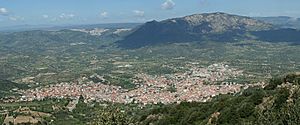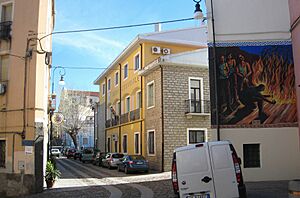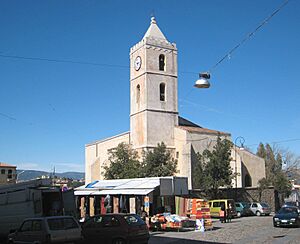Oliena facts for kids
Quick facts for kids
Oliena
Ulìana (Sardinian)
|
|
|---|---|
| Comune di Oliena | |

Oliena (in the foreground)
|
|
| Country | Italy |
| Region | Sardinia |
| Province | Nuoro (NU) |
| Area | |
| • Total | 165.74 km2 (63.99 sq mi) |
| Elevation | 339 m (1,112 ft) |
| Population
(31 July 2016)
|
|
| • Total | 7,123 |
| • Density | 42.977/km2 (111.310/sq mi) |
| Demonym(s) | Olianesi |
| Time zone | UTC+1 (CET) |
| • Summer (DST) | UTC+2 (CEST) |
| Postal code |
08025
|
| Dialing code | 0784 |
| Patron saint | Saint Ignatius of Loyola, San Lussorio |
| Saint day | 31 July – 21 August |
Oliena (pronounced oh-LEE-eh-nah) is a town in the province of Nuoro, located on the beautiful island of Sardinia, Italy. It's a place with a long history and amazing nature.
Contents
History of Oliena
The area where Oliena stands has been home to people for a very long time. We know this because of discoveries made in places like the Grotta Corbeddu cave, which show that people lived here even in the Stone Age.
Ancient Times
Long ago, a special group of people called the Nuragic civilization lived here. They built many interesting structures. In Oliena's territory, there were at least 54 villages, 30 nuraghes (ancient stone towers), and many tombs and sacred buildings.
Medieval Period
During the Middle Ages, Oliena was part of a kingdom called the Giudicato of Torres. Later, it was controlled by the powerful Republic of Pisa.
There was a big war between the Crown of Aragon and the Giudicato of Arborea. Oliena was taken over by the troops of Eleanor of Arborea, a famous Sardinian ruler. The town, which grew around a castle, stayed with Arborea until its kingdom fell.
After that, Oliena became a feudal state, meaning it was owned by powerful families like the Carrozs and later the Osorios. They controlled the town until 1839.
Geography and Nature
Oliena is located on the northeastern side of the Supramonte mountains. It also stretches towards the eastern part of Mount Ortobene. The town is in a valley where the Cedrino river flows, leading to the plains of Galtellì and Orosei.
The main part of Oliena sits about 380 meters (1,247 feet) above sea level. It's right at the foot of Mount Corrasi, which rises steeply into the sky.
Plants and Animals
The mountains and valleys around Oliena are home to many unique plants and animals.
Special Plants
In the hard-to-reach parts of Mount Corrasi, you can find rare plants like:
- Aquilegia nugorensis
- Armeria morisii
- Campanula forsythii
- Cerastium supramontanum
- Erinus alpinus
- Limonium
- Nepeta foliosa
- Paeonia mascula
- Ribes sardoum Martelli
- Taxus baccata
Amazing Animals
The wildlife in Oliena's territory is also very diverse. You might spot:
- peregrine falcon
- royal eagle
- moufflon (a type of wild sheep)
- wild boar
- buzzard
- Sardinian hare
- Sardinian fox
- Sardinian deer
- Speleomantes supramontis (a special kind of newt)
- Griffon vulture
Main Sights to See
Oliena has many interesting places to visit, especially those that show its long history.
Churches
- The Church of Santa Maria was built when Pisa controlled the area.
- The former church of Sant'Ignazio.
- Santa Croce (also known as Santa Rughe).
- San Lussorio.
Ancient Nuraghes
Nuraghes are ancient stone towers built by the Nuragic people. Oliena has several of these impressive structures:
- The Nuraghe Biriài is located between two rocky hills. It was built to overlook the entire Cedrino valley.
- The Nuraghe Luduruju is a single-tower nuraghe made from local stone blocks.
- The Nuraghe Otha'he stands on a rocky outcrop and was once surrounded by a wall.
- Inside the Nuraghe Susùne, there's a special round room called a tholos room.
- Another nuraghe is Nuraghe Suvegliu.
Ancient Tombs
The area also has ancient burial sites:
- The Megalithic sepulchre of Catteddu Crìspu is a large tomb made of huge stone blocks.
- The Domos de Gurpìa are examples of Domus de Janas, which are small cave-like tombs carved into granite rocks.
- Other Domus de Janas include: Domos de Suvangiu, Domos de Jumpàdu, and Domos de Frathale.
Nuragic Villages
- The Nuragic village of Tiscali is hidden inside a large grotto. It was discovered in the late 1600s and was inhabited even during Roman and Medieval times. The huts were built with small stones and mud.
- The Nuragic village of Sedda 'e sos Carros is found in the beautiful Lanaitho Valley.
Economy and Local Products
Oliena's location is perfect for farming because it has good soil and plenty of spring water.
Farming and Special Foods
Farmers in Oliena grow many different things on the plains, like olive trees, fruit trees, grapevines, and vegetables. They also raise sheep and cattle for meat and dairy.
Some of the delicious local products you can find are:
- Sardinian "Pecorino" cheese (made from sheep's milk)
- Cheese cream, called Sa Vrughe
- Sausages, ham, and bacon
- Tammati 'hin vrughe salìa (tomatoes with salty cheese)
Traditional Pasta
- Angelottos
- Ma'harrones de bocciu (gnocchi)
- Maharrones de busa
Sweet Treats
- Sevadas
- 'Hasadinas
- Marigosos
- Amarettos
- Guelfos
- Hidongiadu
- Pistoccos 'hin sa cappa
- Aranciada
- Ori'heddos
- Meli'heddas
Local Breads
- pane carasàu (a very thin, crispy bread)
- Paneddas
Nepente Wine
Oliena is also famous for its special wine called Nepente. This vintage wine is made from carefully selected Cannonau grapes grown right in Oliena. It's a red-brown wine that turns a deep red color as it gets older.
Famous People from Oliena
- Giovanni Corbeddu Salis (1844–1898), a well-known bandit who was sometimes called "The Robin Hood of Sardinia."
- Gianfranco Zola, a famous former football player for teams like Chelsea FC and Cagliari. He also managed West Ham United.
See also
 In Spanish: Oliena para niños
In Spanish: Oliena para niños
 | Selma Burke |
 | Pauline Powell Burns |
 | Frederick J. Brown |
 | Robert Blackburn |




